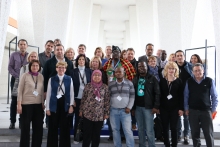PSI Health Taskforce meeting affirms urgent need for Right to Health for all

The first phase of the PSI Right to Health campaign was launched on 12 December 2016. Following the renewed mandate for the campaign at the PSI World Congress last year, attendees committed to stepping it up across the world.
Participants addressed the need for shared strategies on organizing health workers, as the best way to grow the movement’s power.
Dr Jorge Yabkowski from the Argentinian union FESPROSA discussed how his union has directly integrated the campaign into its wider activities.
Panelists from the International Labour Organization (ILO) and World Health Organization (WHO) highlighted the need for social dialogue and respect for health workers who carry out frontline work for the good of their communities. Dr Tana Wuliji from the WHO called for action, saying:
“The scale of change that is required from the status quo is so immense that it is imperative that we work together. There are positive signals of progress in some parts of the world. But we need it to catch fire”.
Dr Wuliji made clear the organisation's support for public investment in healthcare:
“The countries that have made the most gains towards achieving universal health coverage are those that have invested in public health”.
The Task Force meeting came just days after the WHO formalized official relations with PSI. PSI can now participate and intervene within the decision-making structures of the WHO, internationally and regionally.
ILO health sector Expert Christiane Wiskow said:
"The Health Sector is not a burden to economies but contributes to economic growth”.
The ILO held its Tripartite Meeting on Improving Employment and Working Conditions in the Health Services in April last year. Wiskow, who works in the ILO Sectoral Policies Department, which organised the meeting, referred to it as successful and important for future cooperation.
"We met to discuss decent work strategies that effectively address health workforce shortages, as a prerequisite to enable provision of equal access to health care for all.”
Candice Owley, Vice President of the American Federation of Teachers, highlighted the dangers of a lack of public provision:
“In the USA the number one cause of bankruptcy is having to pay medical bills”.
The panelists from WHO and ILO also highlighted the working conditions of female employees in the health sector, pointing out that these have a strong tendency to be worse compared to other sectors. 70 percent of the health and social workforce consists of women. They play essential roles in healthcare delivery globally.
The downside is that some women remain in low skilled jobs and are often at the bottom of the work hierarchy. There are challenging gender gaps in the health and social sector. Given the continued widening of the economic gender gap, it will not be closed for another 217 years, except if farreaching measures are urgently taken. According to Dr Tana Wuliji:
"We cannot wait for another 217 years to achieve the goal of equal pay in the health sector. We have a serious problem and we should deal with it now.”
Rounding up the session, PSI’s Health and Social Services Sector Officer Baba Aye said:
"We have discussed a wide range of issues and this discussion will form the basis of our plan of work in the sector, within the overarching context of the PSI People Over Profit Programme of Action: 2018-2022, with priority accorded to our campaign for universal public health care."

